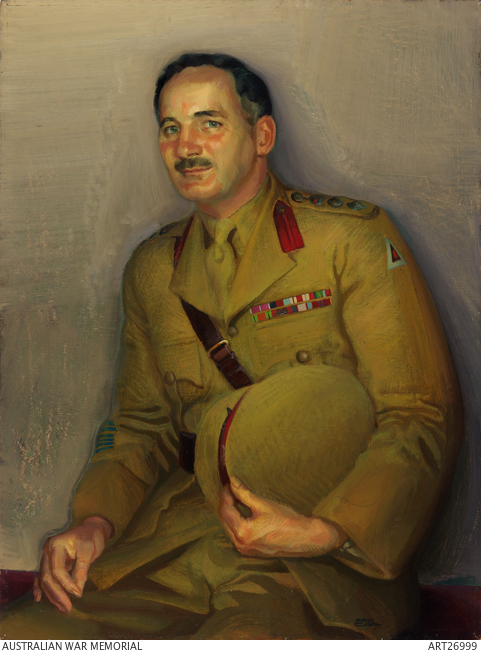| Places | |
|---|---|
| Accession Number | ART26999 |
| Collection type | Art |
| Measurement | Overall: 102 x 76.5 cm |
| Object type | Painting |
| Physical description | oil on hardboard |
| Maker |
Griffin, Murray |
| Place made | Australia: Victoria, Melbourne |
| Date made | 1956 |
| Conflict |
Period 1950-1959 Second World War, 1939-1945 |
| Copyright |
Item copyright: Copyright expired - public domain
|
Colonel Edward (Weary) Dunlop

Colonel (Ernest) Edward 'Weary' Dunlop, OBE, MS Melb, FRCS, FRACS. Perhaps Australia's most well known veteran of the Second World War, Edward Dunlop became well-known for his medical work with Australian prisoners of the Japanese, and his subsequent welfare work on their behalf after the war. Having been in part-time army service since 1930, Dunlop rejoined the military in 1935 as a captain in the Australian Army Medical Corps and also began work at Melbourne Hospital. In 1937 he graduated from Melbourne University as a Master of Surgery before attending St. Bartholomew's Medical School in England where he was admitted to the Royal College of Surgeons in 1938.
In November 1939 Dunlop enlisted in the AIF for service overseas. By May 1940 he had been promoted to major, having served in Jerusalem and was appointed Deputy Assistant Director of Medical Services on the staff of the Australian Corps Headquarters and AIF Headquarters in Gaza and Alexandria.
Dunlop served in the Greek and Crete Campaigns with the 2/2nd Casualty Clearing Station, and was later senior surgeon in Tobruk. When the war in the Pacific began Dunlop's unit was transferred to Java. He was promoted to temporary lieutenant colonel in February 1942 and given command of No. 1 Allied General Hospital at Bandung. When the island fell to the Japanese Dunlop became a prisoner of war.
After being imprisoned on Singapore, Dunlop left for Thailand on 20 January 1943. For the rest of the war he worked as a medical officer on the Burma Thailand railway. The men under his charge suffered under primitive conditions and Dunlop became famous for his care of the ill and his willingness to place himself at risk, despite being unwell himself. Dunlop survived captivity, had his temporary promotion confirmed, and was demobilised in February 1946 after which he transferred to the reserve with rank of honorary colonel.
